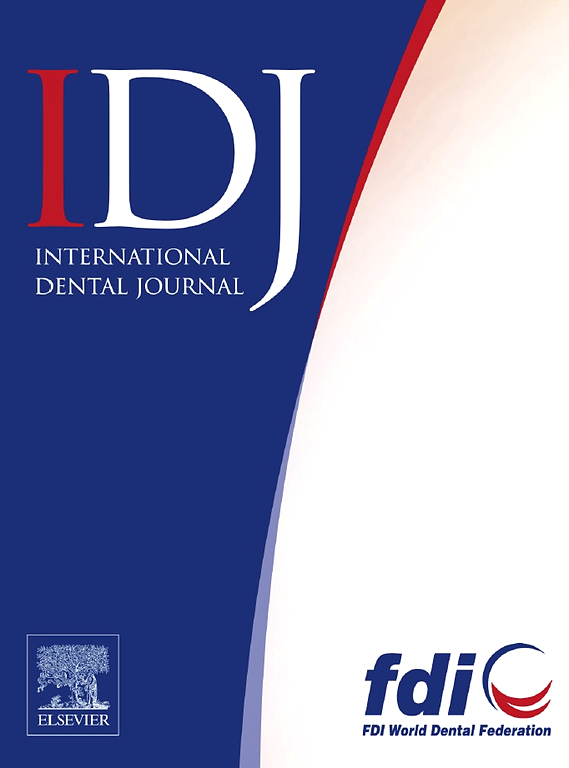Impact of Parental Health Beliefs on Early Childhood Caries: A Two-Year Longitudinal Study
IF 3.2
3区 医学
Q1 DENTISTRY, ORAL SURGERY & MEDICINE
引用次数: 0
Abstract
Introduction and aims
Early childhood caries (ECC) is a widespread chronic condition that significantly affect children’s health and well-being. Although parental psychosocial factors are key to shaping children’s oral health behaviours, few studies have examined the distinct influences of fathers’ vs mothers’ health beliefs. The Health Belief Model (HBM) – which examines health behaviours through perceived susceptibility, severity, benefits, barriers, and self-efficacy – provides a valuable framework for examining these dynamics. This study applied the HBM to investigate the associations between caregiver beliefs, behaviours, and ECC risk, with a focus on differences between fathers and mothers.
Methods
We conducted a longitudinal analysis utilizing data from the Taipei Preschool Oral Health Screening Program (2017-2018), including children aged 3-5 years. Eligible participants had complete oral examination records and parental HBM-based questionnaires for 2 consecutive years. Children with incomplete questionnaires were excluded, yielding a final sample of 6902. Generalized estimating equations assessed associations between caregiver oral health beliefs, self-efficacy, perceived barriers, cues to action, behaviours, and ECC risk, stratified by caregiver type (father or mother).
Results
Higher parental education, better child oral health behaviours, lower perceived barriers, and greater self-efficacy were significantly correlated with reduced ECC risk. Conversely, higher cues to action were linked to increased ECC risk, indicating a reactive rather than preventive approach. Stratified analyses revealed differing patterns: among fathers, only education and oral health knowledge were significantly protective, whereas among mothers, child oral health behaviours, perceived barriers, and self-efficacy were also significant predictors.
Conclusion
Parental psychosocial factors substantially influence ECC risk, with distinct roles for fathers and mothers. These findings highlight the importance of considering caregiver gender in future research and oral health intervention design.
Clinical relevance
Family-centred, gender-specific interventions that address caregiver-specific beliefs and behaviours may improve ECC prevention strategies and help reduce oral health disparities in preschool-aged children.
父母健康信念对幼儿龋齿的影响:一项为期两年的纵向研究
儿童早期龋齿是一种广泛存在的慢性疾病,严重影响儿童的健康和福祉。虽然父母的社会心理因素是塑造儿童口腔健康行为的关键,但很少有研究调查父亲和母亲的健康信念的不同影响。健康信念模型(HBM)通过感知的易感性、严重程度、益处、障碍和自我效能来检查健康行为,为检查这些动态提供了一个有价值的框架。本研究应用HBM来调查照顾者信念、行为和ECC风险之间的关系,重点关注父亲和母亲之间的差异。方法利用台北市学前口腔健康筛查项目(2017-2018)的数据进行纵向分析,包括3-5岁的儿童。符合条件的参与者有完整的口腔检查记录和连续2年的家长hbm问卷。问卷不完整的儿童被排除在外,最终样本为6902人。广义估计方程评估了照顾者口腔健康信念、自我效能感、感知障碍、行动线索、行为和ECC风险之间的关联,并按照顾者类型(父亲或母亲)分层。结果较高的父母教育程度、较好的儿童口腔卫生行为、较低的感知障碍和较高的自我效能感与降低ECC风险显著相关。相反,较高的行动提示与ECC风险增加有关,表明反应性而非预防性方法。分层分析揭示了不同的模式:在父亲中,只有教育和口腔健康知识具有显著的保护作用,而在母亲中,儿童口腔健康行为、感知障碍和自我效能感也是显著的预测因素。结论父母心理社会因素对儿童ECC风险有重要影响,且父亲和母亲的作用不同。这些发现强调了在未来的研究和口腔健康干预设计中考虑照顾者性别的重要性。临床相关性以家庭为中心、针对特定性别的干预措施,解决照顾者特定的信念和行为,可以改善ECC预防策略,并有助于减少学龄前儿童的口腔健康差异。
本文章由计算机程序翻译,如有差异,请以英文原文为准。
求助全文
约1分钟内获得全文
求助全文
来源期刊

International dental journal
医学-牙科与口腔外科
CiteScore
4.80
自引率
6.10%
发文量
159
审稿时长
63 days
期刊介绍:
The International Dental Journal features peer-reviewed, scientific articles relevant to international oral health issues, as well as practical, informative articles aimed at clinicians.
 求助内容:
求助内容: 应助结果提醒方式:
应助结果提醒方式:


